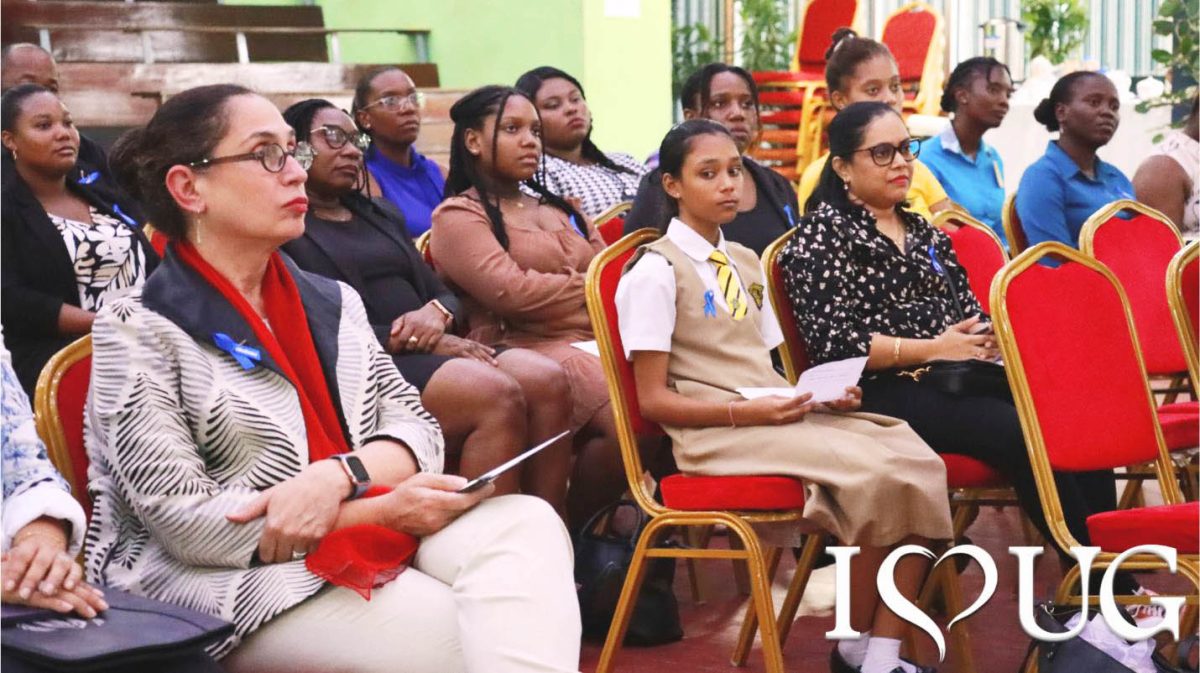University of Guyana (UG) Vice Chancellor Dr Paloma Mohamed Martin has underscored the vital role of institutions in promoting inclusivity and addressing the challenges faced by displaced populations.
Speaking at a panel discussion hosted by UG’s International Centre for Migration and Diaspora Studies in collaboration with the United Nations High Commissioner for Refugees UNHCR), HIAS Guyana and Least of These Foundation, Mohamed reflected on past experiences in Guyana, recounting the profound impact of displacement on vulnerable communities, particularly women and children.
She recalled that in 2018, she witnessed firsthand the plight of displaced individuals at Khan’s Hill, Mabaruma and stressed the urgent need for legal frameworks and humanitarian responses to protect and support these populations. She highlighted efforts at UG to engage in initiatives such as forensic art programmes, aimed at aiding missing children who arrive with non-family members, emphasizing the importance of protecting the most vulnerable.
Mohamed also addressed the complexities of immigration legislation, noting gaps in defining and differentiating refugees from migrants or undocumented arrivals. These challenges, she argued, require comprehensive solutions that uphold human dignity and ensure fair treatment for all.
The discussion was held on June 20 to mark World Refugee Day under the theme, ‘Building Bridges Beyond Borders: Inclusion and Acceptance’ at the George Walcott Lecture Theatre (GWLT), University of Guyana, Turkeyen Campus.
Adriana Negri of the UNHCR emphasized this year’s theme, urging individuals to reflect on the challenges faced by millions who flee their homes due to conflict, persecution, and violence.
Noting the hundreds of millions of forcibly displaced people, she said that the number encapsulated not just statistics, but individual stories of strength, courage, and endurance against all odds. World Refugee Day, she said, was a day, to remember these narratives and to reaffirm the commitment to support them with dignity, compassion, and opportunities to rebuild their lives.
Geographic borders
Negri highlighted the role of shared humanity in bridging geographic borders, emphasizing that despite differences, we are bound together in the responsibility to assist those in need. The UNHCR plays a crucial role in providing international protection and humanitarian assistance to refugees, collaborating with governments and partners to find lasting solutions to displacement.
Education, child protection, gender-based violence prevention, and livelihood support are core sectors where the UNHCR focuses its efforts, aiming to create sustainable pathways for refugees to thrive. Negri’s call to strengthen commitments echoes the agency’s mission to foster inclusive environments where every individual, regardless of their background, finds acceptance and opportunity.
In her address, Economic Inclusion Specialist at HIAS Guyana Lyn Morales shed light on the resilience exhibited by refugees throughout their journeys — before, during, and after displacement. Morales underscored the immense challenges refugees face as they strive to escape perilous situations and establish new lives in unfamiliar lands under varying conditions.
“Refugees must exhibit extraordinary resilience to navigate their way to safety,” Morales said, painting a vivid picture of the harrowing journey refugees undertake. “Under immense duress, passports may be damaged, funds lost, and countless tragic incidents occur,” she noted.
Despite these adversities, Morales highlighted numerous benefits refugees bring to their host countries. She spoke about the cultural richness refugees contribute, noting the introduction of foods like arepas and empanadas that add a vibrant new dimension to Guyanese culture. Moreover, Morales emphasized the positive economic impact of refugees, describing them as a skilled workforce driven by the necessity to succeed in their new environments.
“These individuals bring not only their unique cultural backgrounds but also a strong work ethic born out of necessity,” Morales remarked. “Their resilience and determination serve as a testament to the human spirit’s ability to endure and thrive in the face of adversity.”
HIAS supports refugees in over 23 countries worldwide.
Founder of the Least of These Foundation Sharon James drew attention to the profound trauma experienced by displaced children, shedding light on issues often overlooked. These children endure emotional distress stemming from their experiences in home countries, the arduous displacement process, and the harsh realities of their new environments. Challenges such as inadequate medical care, violence, and food shortages exacerbate their plight, as they transition from stable homes to refugee camps with limited resources.
James emphasized the difficulties these children face in articulating their feelings in unfamiliar surroundings, uncertain of how their expressions will be received. Despite these challenges, she said there were positive impacts including cultural exchange, knowledge sharing, and the introduction of new games, foods, and skills that enrich host communities in unexpected ways.
UNHCR’s Associate GBV Officer Franchesca Tomaso and Associate Protection Officer Jenel Greene delivered a summary of International Law, International Refugee Law, and International Human Rights Law. They stressed the pivotal role of sustainable solutions promoted by governments through inclusive policies and pathways to employment. Emphasizing the government’s duty as the primary protector of its citizens and all individuals within its jurisdiction, they highlighted the necessity of partnering with NGOs and UNHCR to build collaborative relationships aimed at achieving lasting solutions.
According to the 1951 Convention Article 1, a refugee is someone who “owing to well-founded fear of being persecuted for reasons of race, religion, nationality, membership of a particular social group or political opinions, is outside the country of his nationality and is unable to owing to such fear willing to avail himself of the protection of that country (…)”.
At the end of 2023, the number of forcibly displaced people reached a staggering 117.3 million worldwide. As of June 2024 it has exceeded 120 million.




